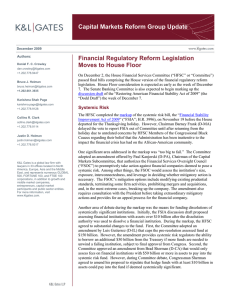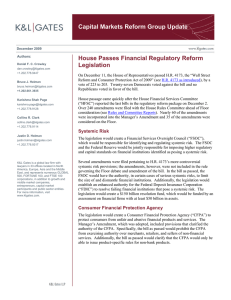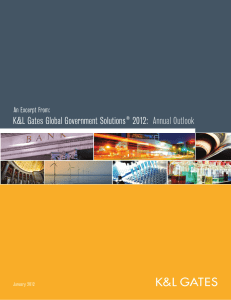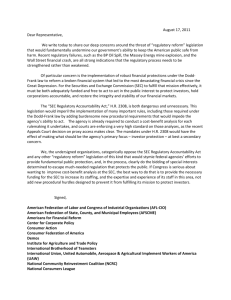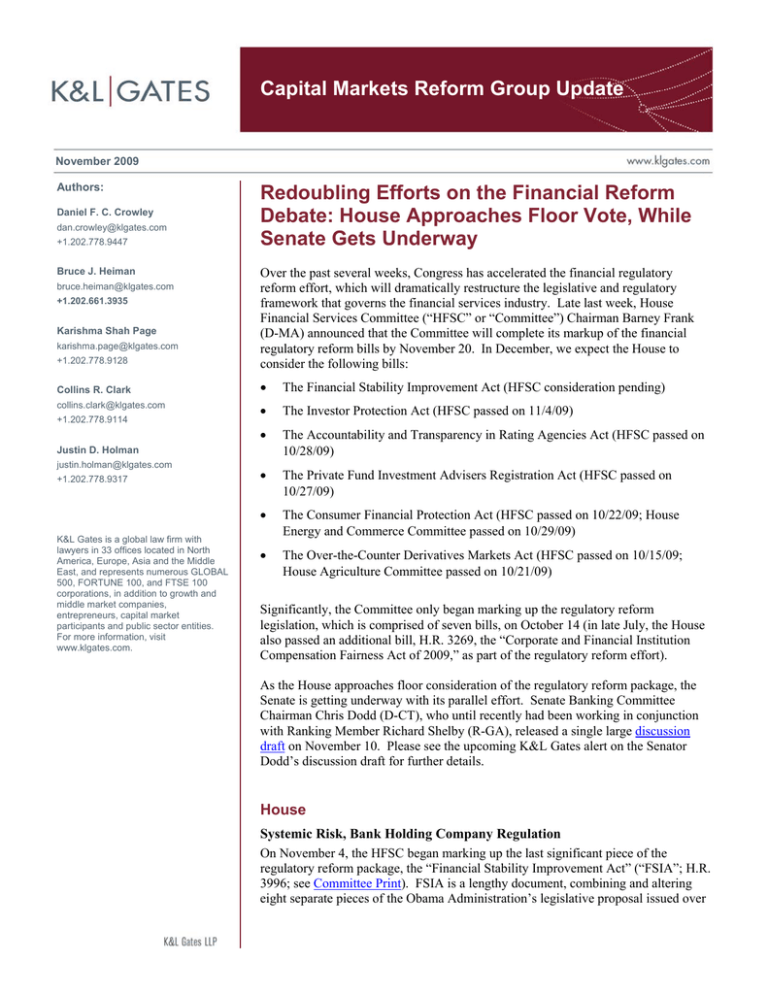
Capital Markets Reform Group Update
November 2009
Authors:
Daniel F. C. Crowley
dan.crowley@klgates.com
+1.202.778.9447
Bruce J. Heiman
bruce.heiman@klgates.com
+1.202.661.3935
Karishma Shah Page
karishma.page@klgates.com
+1.202.778.9128
Collins R. Clark
collins.clark@klgates.com
+1.202.778.9114
Redoubling Efforts on the Financial Reform
Debate: House Approaches Floor Vote, While
Senate Gets Underway
Over the past several weeks, Congress has accelerated the financial regulatory
reform effort, which will dramatically restructure the legislative and regulatory
framework that governs the financial services industry. Late last week, House
Financial Services Committee (“HFSC” or “Committee”) Chairman Barney Frank
(D-MA) announced that the Committee will complete its markup of the financial
regulatory reform bills by November 20. In December, we expect the House to
consider the following bills:
•
The Financial Stability Improvement Act (HFSC consideration pending)
•
The Investor Protection Act (HFSC passed on 11/4/09)
•
The Accountability and Transparency in Rating Agencies Act (HFSC passed on
10/28/09)
•
The Private Fund Investment Advisers Registration Act (HFSC passed on
10/27/09)
•
The Consumer Financial Protection Act (HFSC passed on 10/22/09; House
Energy and Commerce Committee passed on 10/29/09)
•
The Over-the-Counter Derivatives Markets Act (HFSC passed on 10/15/09;
House Agriculture Committee passed on 10/21/09)
Justin D. Holman
justin.holman@klgates.com
+1.202.778.9317
K&L Gates is a global law firm with
lawyers in 33 offices located in North
America, Europe, Asia and the Middle
East, and represents numerous GLOBAL
500, FORTUNE 100, and FTSE 100
corporations, in addition to growth and
middle market companies,
entrepreneurs, capital market
participants and public sector entities.
For more information, visit
www.klgates.com.
Significantly, the Committee only began marking up the regulatory reform
legislation, which is comprised of seven bills, on October 14 (in late July, the House
also passed an additional bill, H.R. 3269, the “Corporate and Financial Institution
Compensation Fairness Act of 2009,” as part of the regulatory reform effort).
As the House approaches floor consideration of the regulatory reform package, the
Senate is getting underway with its parallel effort. Senate Banking Committee
Chairman Chris Dodd (D-CT), who until recently had been working in conjunction
with Ranking Member Richard Shelby (R-GA), released a single large discussion
draft on November 10. Please see the upcoming K&L Gates alert on the Senator
Dodd’s discussion draft for further details.
House
Systemic Risk, Bank Holding Company Regulation
On November 4, the HFSC began marking up the last significant piece of the
regulatory reform package, the “Financial Stability Improvement Act” (“FSIA”; H.R.
3996; see Committee Print). FSIA is a lengthy document, combining and altering
eight separate pieces of the Obama Administration’s legislative proposal issued over
Capital Markets Reform Group Update
the summer (Title I, Title II, Title III, Title VI, Title
VIII, Subtitle E of Title IX, Title XII, and Title
XIII).
Among other things, FSIA would:
•
Create a Financial Services Oversight Council
(“FSOC”) to monitor systemic risks;
•
Consolidate holding company regulation and
subject additional institutions to regulation as
bank holding companies, such as those owning
non-bank institutions like industrial loan
companies (“ILCs”) or credit card banks (unlike
the Obama Administration’s proposal, which
would have eliminated most non-bank
institutions);
•
•
•
•
Merge the Office of Thrift Supervision (“OTS”)
into a division of the Office of the Comptroller
of the Currency (“OCC”), while preserving the
thrift charter (contrary to the Obama
Administration’s proposal, which would have
abolished the thrift charter and merged the OTS
and OCC to form the new National Bank
Supervisor);
Subject firms or activities that pose significant
risks to the financial system to heightened
regulations (these firms, previously called “Tier
1 Financial Holding Companies” under the
Obama Administration’s proposal, are now
known as “identified financial holding
companies”);
Provide resolution authority for non-bank
financial institutions; and
•
Scope of “financial company” and “identified
financial holding company”: There is
significant controversy over the scope of the
term “financial company” and the process of
assessing whether an institution is an “identified
financial holding company.”
•
Powers of the Board of Governors of the
Federal Reserve System (“Federal Reserve”).
•
Whether FSOC will have authority to trump
accounting standards.
Chairman Frank has said he hopes to complete the
markup by November 20.
Investor Protection
On November 4, the HFSC reported favorably the
“Investor Protection Act” (“IPA”; H.R. 3817; see
discussion draft and amendments) by a vote of 41 to
28. Among other things, the bill would:
•
Impose a fiduciary duty on brokers, dealers, and
investment advisers “to act in the best interest
of the customer without regard to
[compensation]” and such standard of conduct
“shall be no less stringent than” the standard for
advisers under the Investment Advisers Act;
•
Authorize FINRA to oversee any investment
adviser who has any legal or financial
connection with a broker;
•
Require the registration of municipal financial
advisers and impose upon them “a fiduciary
duty,” as defined by the Securities and
Exchange Commission (“SEC”);
•
Authorize the SEC to “restrict or prohibit”
mandatory pre-dispute arbitration clauses;
•
Exempt companies with less than $75 million in
capital from section 404(b) of Sarbanes-Oxley;
•
Establish a fund to pay monetary awards to
whistleblowers;
•
Make persons liable for aiding and abetting “to
the same extent as the person to whom such
assistance is provided”;
Require credit risk retention.
At the time of this writing, Chairman Frank had
limited the markup to “non-controversial”
amendments, intending to address more difficult
issues during the week of November 16. Areas of
controversy include:
•
Committee Democrats have raised concerns
with this approach and have instead proposed a
pre-assessed Resolution Fund.
Funding the new resolution authority: FSIA
initially included a proposal to fund the
resolution authority through an assessment on
all financial institutions with assets over $10
billion, which would be assessed after the use of
the resolution authority. A number of
November 2009
2
Capital Markets Reform Group Update
•
•
Create a Financial Reporting Forum made of
regulators and industry representatives to “meet
and discuss . . . issues critical to financial
reporting”; and
A requirement that advisers to most onshore
and offshore private funds register with the
SEC;
•
A blanket carve-out for advisers to certain
foreign private funds and small business
investment companies;
•
An exemption from SEC registration for
advisers to venture capital funds and private
funds with less than $150 million in assets,
although both would still be subject to SEC
recordkeeping and reporting requirements;
•
A requirement that advisers maintain and file
records with the SEC in order to determine
whether a particular fund poses a systemic risk;
•
Information sharing among the SEC, the
Federal Reserve, and any other entity the SEC
identifies as having systemic risk responsibility;
and
•
A one-year transition period for investment
adviser registration.
Establish an Investor Advisory Committee to
“advise and consult” with the SEC.
Credit Rating Agencies
On October 28, the HFSC reported favorably the
“Accountability and Transparency in Rating
Agencies Act” (H.R. 3890; see discussion draft and
amendments) by a vote of 49 to 14. As passed by
the Committee, the bill:
•
•
Allows investors to sue agencies that
“knowingly or recklessly” fail to review key
information in their ratings;
•
Provides the SEC with the authority to sanction
supervisors at credit rating agencies for failing
to supervise employees;
•
Requires each agency to have a board with at
least one-third independent directors and these
directors shall oversee policies and procedures
aimed at preventing conflicts of interest and
improving internal controls;
•
Contains requirements designed to mitigate the
conflicts of interest that arise out of the issuerpays model for compensating rating agencies;
•
Includes disclosure provisions, including on
payment; and
•
Requires that if certain rating agency employees
go to work for an issuer, the agency conduct a
one-year look-back into the ratings in which the
employee was involved to make sure that its
procedures were followed and proper ratings
were issued.
Private Funds
On October 27, the HFSC reported favorably the
“Private Fund Investment Advisers Registration
Act” (“PFIARA”; H.R. 3818; see discussion draft
and amendments) by a vote of 67 to 1. Key
provisions of PFIARA include:
Areas of ongoing controversy include (1) whether
family offices or family trusts should have an
exemption from registration; (2) what, if any, other
groups should receive a carve-out from the
legislation; and (3) how best to protect proprietary
information that is shared among agencies.
Consumer Financial Protection Agency
On October 22, the HFSC reported favorably the
“Consumer Financial Protection Act” (H.R. 3126;
see Manager’s Amendment and amendments) by a
vote of 39 to 29. The bill, as passed by the HFSC,
would:
•
Create a Consumer Financial Protection Agency
(“CFPA”) with supervisory, examination, and
enforcement authority over consumer financial
products and services;
•
Exempt non-financial businesses, and products
and services currently under the jurisdiction of
the SEC or the Commodities Futures Trading
Commission (“CFTC”); in addition, banks with
$10 billion or less in assets and credit unions
with $1.5 billion or less in assets can continue
to be examined by their primary regulator rather
than by CFPA examiners;
November 2009
3
Capital Markets Reform Group Update
•
Provide broad authority to promulgate new
regulations and interpret regulations under 12
existing consumer banking laws; and
•
Allow for stringent enforcement by the CFPA,
the Department of Justice, the prudential
regulatory agencies, the state Attorneys General,
other state authorities, and through private rights
of action.
For additional information on the CFPA, please see
the recent K&L Gates Alert Analysis of Consumer
Financial Protection Agency Legislation: Top Ten
Issues.
Subsequently, the House Energy and Commerce
Committee, which has jurisdiction over aspects of
the bill, requested sequential referral of the bill. The
Energy and Commerce Committee reported
favorably its version of H.R. 3126 on October 29 by
a vote of 33 to 19 (see Committee Print and
amendments). Significantly, this version of the bill
establishes a five-member commission to run the
CFPA. Chairman Frank opposes such an approach;
the HFSC version of the bill would instead have the
agency operated by a single director.
Negotiations and additional modifications are
expected before the bill reaches the House floor.
Over-the-Counter Derivatives
On October 15, the HFSC reported favorably the
“Over-the-Counter Derivatives Markets Act” (H.R.
3795; see discussion draft and amendments) by a
vote of 43 to 27. Key provisions of H.R. 3795, as
passed by the HFSC, include:
•
A requirement that standardized swap
transactions where both counterparties are either
dealers or major swap participants be cleared;
•
An exemption from clearing standardized swap
transactions that involve end-users;
•
A requirement that a standardized and cleared
swap transaction where both counterparties are
either dealers or major swap participants be
executed on a Board of Trade, a National
Securities Exchange or a swap execution
facility;
•
A requirement that swap dealers and major
swap participants register with either the SEC
or the CFTC and with both agencies if
applicable;
•
Mandatory reporting and recordkeeping for all
over-the-counter derivative transactions;
•
A requirement that swap transactions that are
not cleared and for which no trade repository
exists be reported to the relevant agency; and
•
Mandatory registration with the SEC or CFTC
as a swap execution facility for facilities that
trade swaps that are not Boards of Trade or
National Securities Exchanges.
On October 21, the House Agriculture Committee,
which has joint jurisdiction, favorably reported its
version of H.R. 3795 by voice vote (see Committee
Print and amendments). Although the two
Committee versions are similar in many respects,
there are differences. The Rules Committee will
likely issue a rule reconciling the areas in which the
two bills diverge.
On November 3, HFSC Chairman Frank wrote a
letter to SEC Chairman Mary L. Schapiro and
CFTC Chairman Gary Gensler asking for help in
bolstering the legislation. One bill provision that
may be modified deals with who decides whether a
trade can be cleared. As written, the legislation
allows the clearinghouse to decide; however, a
potential conflict of interest exists because financial
firms have a stake in some clearinghouses and may
not push for a swap to be cleared. As a result,
Chairman Frank will seek to allow the relevant
agency to determine whether a swap transaction
should be cleared.
Senate
Over the past several months, Senate Banking
Committee Chairman Dodd and Ranking Member
Shelby have been quietly negotiating a Senate
regulatory reform package. As noted previously,
Chairman Dodd released a discussion draft, which
takes the form of a single, large bill, on November
10.
The Senate legislation differs from the House
version in a number of significant aspects. Most
November 2009
4
Capital Markets Reform Group Update
notably, the Senate legislation calls for the
consolidation of all existing banking regulators – the
Federal Reserve, the FDIC, the OTS, and the OCC.
An additional area of controversy is the CFPA.
Although Chairman Dodd has said that the CFPA is
an essential element of regulatory reform, Ranking
Member Shelby and other panel Republicans are
opposed to the idea, and instead support increased
consumer protection efforts within existing
regulatory bodies. Finally, Chairman Dodd is less
enthusiastic about giving new systemic risk
responsibilities to the Federal Reserve and is
inclined toward giving more responsibility in that
area to the FSOC.
Chairman Dodd has indicated that the Senate
Banking Committee could begin marking up the
legislation as early as the end of November and will
work into December. However, in light of
competing priorities, Senate floor action may still
not occur until early next year.
Please see previous K&L Gates alerts, including
Congress Builds on Obama Financial Regulatory
Reform Approach, as Reform Efforts Proceed and
House and Senate Take Expedited But Divergent
Approaches to Financial Regulatory Reform Plan
for additional information about the reform effort.
In addition, please see the K&L Gates Global
Financial Market Watch Blog for detailed analysis
on many of the Obama proposals and future
updates.
Anchorage Austin Beijing Berlin Boston Charlotte Chicago Dallas Dubai Fort Worth Frankfurt Harrisburg Hong Kong London
Los Angeles Miami Newark New York Orange County Palo Alto Paris Pittsburgh Portland Raleigh Research Triangle Park
San Diego San Francisco Seattle Shanghai Singapore Spokane/Coeur d’Alene Taipei Washington, D.C.
K&L Gates is a global law firm with lawyers in 33 offices located in North America, Europe, Asia and the Middle East, and represents numerous
GLOBAL 500, FORTUNE 100, and FTSE 100 corporations, in addition to growth and middle market companies, entrepreneurs, capital market
participants and public sector entities. For more information, visit www.klgates.com.
K&L Gates comprises multiple affiliated partnerships: a limited liability partnership with the full name K&L Gates LLP qualified in Delaware and
maintaining offices throughout the United States, in Berlin and Frankfurt, Germany, in Beijing (K&L Gates LLP Beijing Representative Office), in
Dubai, U.A.E., in Shanghai (K&L Gates LLP Shanghai Representative Office), and in Singapore; a limited liability partnership (also named K&L
Gates LLP) incorporated in England and maintaining offices in London and Paris; a Taiwan general partnership (K&L Gates) maintaining an office in
Taipei; and a Hong Kong general partnership (K&L Gates, Solicitors) maintaining an office in Hong Kong. K&L Gates maintains appropriate
registrations in the jurisdictions in which its offices are located. A list of the partners in each entity is available for inspection at any K&L Gates office.
This publication is for informational purposes and does not contain or convey legal advice. The information herein should not be used or relied upon
in regard to any particular facts or circumstances without first consulting a lawyer.
©2009 K&L Gates LLP. All Rights Reserved.
November 2009
5

